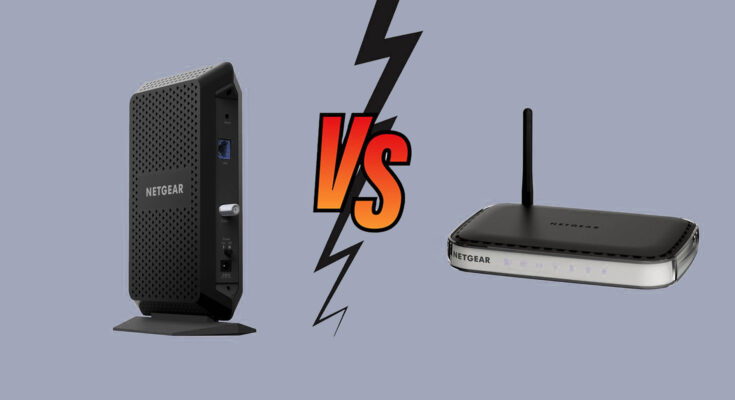In the ever-evolving landscape of technology, staying informed about the devices that power our digital lives has become increasingly important.
Two such devices that often find their way into conversations are modems and routers. These integral components play distinct yet interconnected roles in bringing the Internet into our homes and offices.
In this comprehensive guide, we delve into the intricacies of modems and routers, highlighting their differences, functions, and the crucial role they play in establishing a seamless online experience.
Unveiling the Modem: Gateway to the Digital Realm
What is a Modem? A modem, short for modulator-demodulator, acts as the bridge between your home network and your Internet Service Provider (ISP).
Essentially, it’s the device responsible for translating the digital data from your ISP into a format that can be easily understood by your devices. Conversely, it converts the data generated by your devices into a format that can be transmitted back to your ISP.
The Function of a Modem
A modem’s primary function is to provide internet access by establishing a connection between your local network and your ISP. It does so by modulating digital data from your ISP into analog signals that can travel over traditional phone lines or modern fiber-optic cables.
When receiving data, the modem demodulates these analog signals back into digital data, allowing your devices to access websites, stream content, and engage in online activities.
Types of Modems
There are various types of modems available, each tailored to different internet connection types. Common types include DSL modems for digital subscriber lines, cable modems for cable internet connections, and fiber-optic modems for ultra-fast fiber connections.
Choosing the best modem router combo for your internet connection is crucial to ensure optimal performance.
The Router: Navigating Your Network
While a modem facilitates the connection between your home network and the wider internet, a router takes the reins of managing the flow of data within your local network. It serves as the central hub through which devices in your home or office communicate with each other.
The Function of a Router
A router plays a pivotal role in directing network traffic to the appropriate devices. It assigns unique IP addresses to each device, enabling seamless communication. Moreover, routers often include built-in security features such as firewalls that safeguard your network from unauthorized access and potential cyber threats.
Wireless Connectivity
One of the standout features of modern routers is their ability to provide wireless connectivity. This means that devices like smartphones, laptops, and smart home gadgets can connect to the internet without the need for physical cables.
The router acts as a wireless access point, enabling these devices to access the internet and communicate with each other wirelessly.
Distinguishing Differences: Modem vs. Router
- Primary Function
In essence, the primary function of a modem is to establish a connection to the internet, translating data between your ISP and your devices. On the other hand, a router’s primary function is to manage local network traffic, ensuring devices can communicate with each other efficiently.
- Dependency
While a modem is a mandatory device for connecting to the internet, a router is not strictly necessary. However, a router enhances the functionality and security of your network, making it a highly recommended addition to your setup.
- Physical Appearance
Physically, modems and routers can sometimes be integrated into a single device, especially in cases where internet service providers offer combination units. However, they remain distinct in their functions.
- Interaction
To put it simply, a modem interacts with your ISP, while a router interacts with the devices on your local network.
Achieving Synergy: Modem and Router Working Together
- Complementary Roles
Understanding the distinction between a modem and a router is crucial, as they often work in tandem to deliver a seamless online experience.
The modem establishes the connection to the internet, while the router manages the data distribution within your network.
This collaborative effort ensures that you can access websites, stream videos, play online games, and connect with others without disruptions.
- Choosing the Right Devices
When setting up your home or office network, selecting the right modem and router is paramount. Consider your internet connection type, speed requirements, and the number of devices that will be connected.
Investing in high-quality wifi routers for long-range ensures that you make the most of your online activities.
Conclusion
In the digital age, where connectivity is a cornerstone of daily life, comprehending the roles of devices like modems and routers is empowering. A modem serves as your gateway to the vast expanse of the internet, while a router navigates the intricate pathways of your local network.
By understanding their functions and differences, you’re better equipped to create a robust network environment that fosters seamless communication, efficient data transfer, and enhanced security.
Related Post: What is the Difference Between Wifi and the Internet



